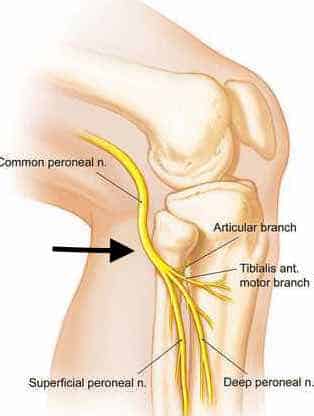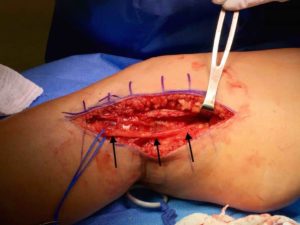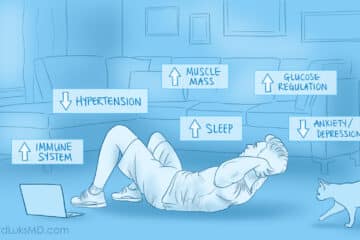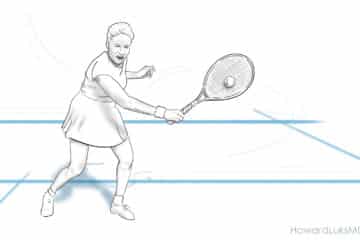
The peroneal nerve is a large nerve that starts from behind your knee and travels down the outer side of your leg. The peroneal nerve sits close to a bone we call the fibula neck. In this region the nerve can be injured by compression from the soft tissue and bone. The peroneal nerve is also capable of being injured by trauma to the knee. Peroneal nerve compression is an uncommon cause of leg pain. If your leg pain does not improve over time, or with various medications, then surgery to release the peroneal nerve might be necessary and is usually very successful.
The peroneal nerve is one of the more exposed nerves in our body. It wraps around a bone on the outside of the knee. That bone tethers the nerve in position. That leaves the nerve vulnerable to repetitive stress injury(compression), injury during surgery, or injury from trauma to the knee.

Peroneal nerve compression and leg pain
Pain on the outer side of your leg might be due to peroneal nerve compression. Some patients describe a long standing deep ache on the lateral or outer side of their leg. Some will develop numbness or weakness of the muscles that the nerve controls. Nearly every patient will have subtle differences.
Making an accurate diagnosis of peroneal nerve compression or injury can be tricky. There are many tests we can order to determine if there peroneal nerve is the source of your pain. Those tests include and EMG which tests how well the nerve signals are working in your leg. But a normal EMG does not mean that your nerve isn’t being compressed. I have seen a few patients with a normal EMG who eventually responded very well to surgery to release the nerve. A careful physical examination is also necessary. During the examination we try to determine if your pain, numbness and/or weakness is because of a peroneal nerve problem in the leg, or perhaps it is a manifestation of compression higher up in your back.
Peroneal nerve surgery
After an examination and necessary testing to assess the function of your peroneal nerve we can discuss treatment options. For those with issues due to a nerve injury, simply waiting for the nerve to recover may be all that’s necessary. For those of you with suspected nerve compression we may eventually chose to pursue surgery to release the nerve. During the surgery the nerve is located near the neck of the fibula and it is released as it enters your leg where it splits into many different branches. In some patients we need to trace the nerve back up your leg too.
If the peroneal nerve was the cause of your leg pain then you should notice an improvement in your pain in a matter of a few days. If you had a foot drop or severe weakness it may take many, many months to see if the nerve will recover. In some instances, the nerve will not recover, despite surgery.
Leg pain due to peroneal nerve compression is probably more common than we think it is. Often times, the very tests we perform to try and support our diagnosis will complicate the situation. In many of the cases I have seen over the years the tests we ordered were inconclusive, but we ultimately proceeded with a release and had very successful results. As we were taught in medical school. Sometimes you need to rely on your diagnostic skills and clinical suspicions.















Good
Hoping doc looks at this from time to time.
I went to a neighbor’s fire works years ago. A rocket hit me in the knee.
I went to the doc but didn’t want to say I was hit with fireworks.
I just said I fell.
Both before that and after, my legs go ‘dead” in the bath tub
and in swimming. Now I am 80 ish and have something close to foot drop and
having been falling without using a cane when I should. I can’t really tell if
it is both legs or one. Wonder which tests might be best? I have a pacemaker to boot!!
thanks for any one’s input
Lew
HI Lew…
There are many reasons why an 80-year-old might have a foot drop. Some issues are related to the lumbar spine and some are related to the nerve further down the leg. You need to a good exam to determine which it might be. Tests like an MRI might be useful, and a nerve test called an EMG might be useful. Which test you need will be based on your physical examination.
Good luck
I would love to think that this may help even one person. I am a 79 year old male. Both knees have been professionaly diagnosed as ” shot” due to many years of running however i walk ok and pain free . excepting that is for a pain that was developing in my outer lower right leg exactly as described in above artical re Peroneal Nerve. By accident i found a tender spot on the outer side just below my knee and gently massaged it with finger tips until tender no more. That was several days ago and i am delighted that i have had no lower leg pain since. Just felt i would like to pass this on ……. Thanks John Webber NZ